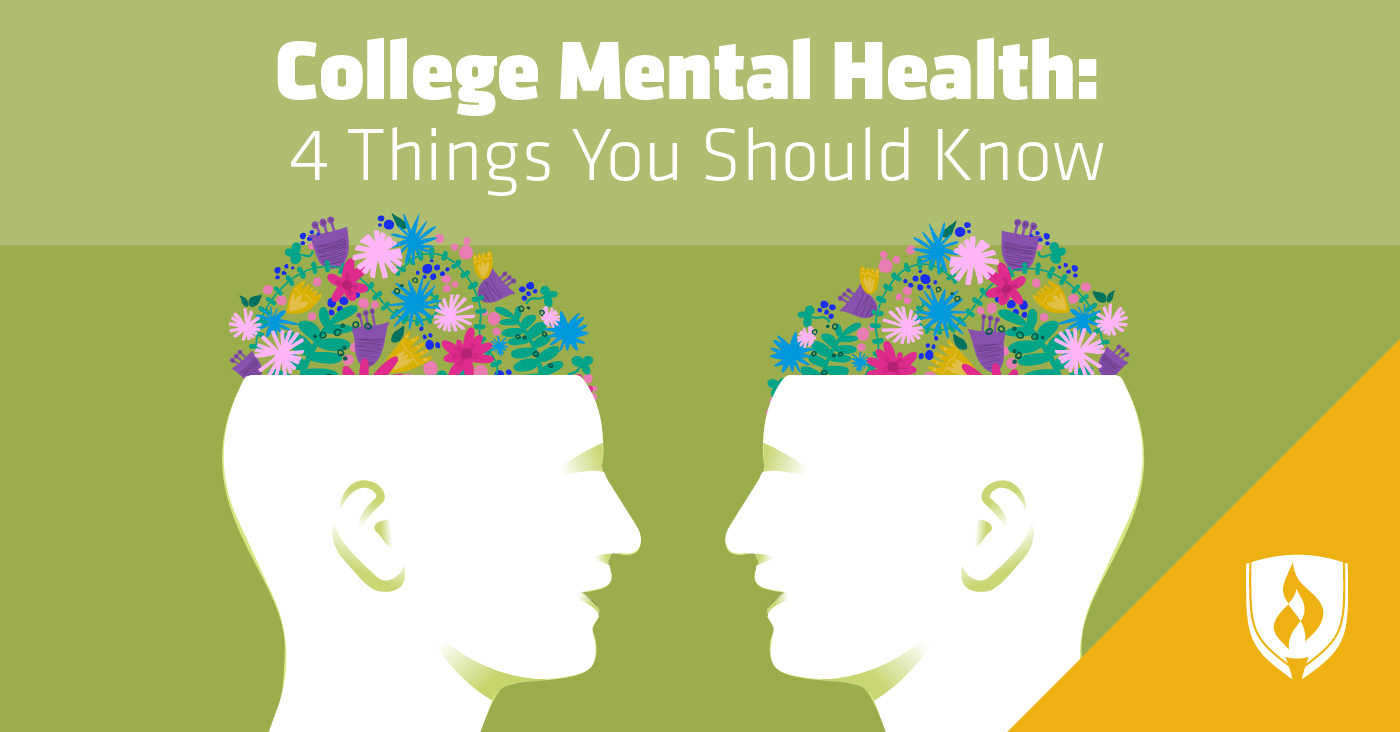
According to a World Health Organization global survey, more than one-third of first-year college students are impacted by mental health struggles.1 These mental health issues can include—but aren’t limited to—serious consideration or attempts at suicide, depression, eating and anxiety disorders. Despite the prevalence of these issues, many struggling students don’t seek treatment.
“Over the years, I’ve seen an increase in students dealing with—and reporting to me—mental health struggles,” affirms Karen Southall Watts, a college instructor who has also spent time working on a suicide hotline and as a counselor in a domestic violence program. While alarming, increases in the number of mental health issues on college campuses, she poses, isn’t all bad news.
“Higher [reported] numbers reflect a bit of the greater acceptance that mental health is a normal, everyday, everybody kind of issue, and students are more comfortable telling us they need assistance,” Watts explains. As the stigma surrounding mental illness continues to lift, students are becoming more inclined to seek help while the resources available to them continue to multiply.
We dug into the statistics and spoke with a handful of experts on mental health to learn more about why college students are susceptible to mental illness and what they can do to preserve their psychological well-being. Read on to learn more about this burgeoning phenomenon.
The truth about mental illness in college
A 2017 survey from the Association for University and College Counseling Directors revealed that today’s college population is primarily dealing with three major mental health conditions: anxiety, stress and depression.2
Anxiety, depression and panic attacks are sending college students to mental health clinics in record numbers. In fact, the APA reports that counseling centers have seen a 30 percent increase in college students seeking support between the 2009-10 and 2014-15 academic years.3 While that may seem like an alarming jump, the APA suggests some of this increase can be attributed to public education campaigns that are aimed at reducing the stigma of reporting mental health issues. This means we may just be getting a more honest look at mental health issues than we have in the past.
The APA reports that among surveyed students, 61 percent reportedly sought help coping with anxiety. Forty-nine percent reported struggling with depression, 45 percent with stress, 28 percent with academic performance and 27 percent with relationship problems.3
Watts sees students like this regularly. “Some of the issues I see almost every academic quarter include students who have—both treated or untreated—anxiety or depression, students with PTSD, students with ‘everyday stress’ that becomes overwhelming and students experiencing substance abuse or addiction,” she says.
Cody Higgs, a licensed professional counselor who specializes in working with young women who struggle with mental health, explains that college can be a very unique experience for students. “The stress of classes, projects and exams can become overwhelming and contribute to anxiety,” he explains. “Frequently, this is when college students show up in my office. There may be too much stress, too little support and [they have] no idea where to turn.”
Licensed marriage and family therapist and director of counseling services at Woodbury University, Stevon Lewis, acknowledges the benefit of students entering college with more familiarity with mental health services. Many, he says, have been in treatment prior to their arrival at college.
But amidst the wave of resources available to them, students are also entering into some monumental new experiences, which can exacerbate existing mental health struggles. “Many students are entering college devoid of coping skills to assist them with navigating and managing the rigors of collegiate life,” he says. “This often leaves them unable to thrive academically and, in my experience, [they] express suicidal ideation more frequently.”
While it’s clear that college mental health is of utmost importance, what can be done to help prevent or overcome these struggles when they surface? We’ve coupled the advice from our experts with recommendations from the National Alliance on Mental Illness (NAMI) to formulate four actionable tips to preserve your mental well-being while in college.4
4 tips to help support your mental health in college
You’re now aware the college mental health struggles are very real. Knowing this up front can help you take some proactive steps to avoid any potential obstacles. Consider the following advice.
1. Maintain a healthy lifestyle
Did you know that one of the most beneficial things you can do for your mental health is to tend to your physical health? The unfamiliar challenge of embarking on a new experience in tandem with the rigor of college classes can result in students deprioritizing their health.
According to NAMI, exercising, eating a balanced diet and getting at least seven hours of sleep will give you more energy, help you focus better and keep you emotionally resilient.4 Don’t forget to also make time to spend with friends and family or to simply relax—a little self-care can go a long way when it comes to your mental health.
2. Avoid self-medicating
When attempting to cope with mounting stress, the short-term reprieve seemingly offered by alcohol and other substances may be alluring. But those struggling with mental illness may find that substances can bring about their own mental health risks, such as exacerbating things like anxiety and depression.
NAMI suggests that those who are dealing with mental health issues avoid or at least limit their consumption of alcohol or other substances.4 When searching for ways to unwind, you may find it more productive to spend your time socializing with friends, experiencing new activities in your city or indulging in a relaxing hobby like cooking or reading.
3. Know when it’s time to ask for help
A huge part of tending to your mental health is understanding the warning signs that may signify it’s time to seek some external help, whether that be reaching out to a professor, arranging an appointment with a counselor or even confiding in a confidant for support.
Signs to be on the lookout for may include the following:
- Difficulty concentrating
- Loss of energy
- Reckless behavior
- Mood swings
- Eating changes
- Shifts in sleeping patterns
- Withdrawal
- Aggression
- Irritability
- General loss of interest
NAMI suggests keeping a short, daily record of your symptoms. This can help ensure that you notice if or when things worsen.4
4. Learn more about mental illness
Finally, one of the most effective things you can do is to arm yourself with ample knowledge related to mental health and mental illness. Look into resources offered by your school—you may be able to connect with a counselor or a support group through that venue.
You can also seek out NAMI resources or affiliates in your local community.4 And you can even use your college platform to your advantage by enrolling in courses related to psychology, social work or counseling to learn more about the inner workings of the things you may be experiencing.
Take control of your mental health in college
As you embark upon your college experience, the last thing you want is to be held back by mental health struggles that feel out of your control. But that’s easier said than done when immersed in a new and sometimes stressful environment in which you’re expected to perform well.
The information above has hopefully equipped you to take a few steps toward taking charge of your mental health. While stress is only one factor influencing your overall mental health, it doesn’t hurt to seek out strategies for managing it. Consider pursuing some of the methods we’ve outlined in our article “7 Stress-Relieving Activities to Keep You Calm, Cool & Collected” to help keep stress in check.
1American Psychological Association, Journal of Abnormal Psychology, WHO World Mental Health Surveys International College Student Project: Prevalence and Distribution of Mental Disorders [accessed February 5, 2019] https://www.apa.org/images/abn-abn0000362_tcm7-245182.pdf
2Association for University and College Counseling Center Directors, AUCCCD Annual Survey 2016-2017 [accessed February 5, 2019] https://www.aucccd.org/assets/documents/Governance/2017%20aucccd%20survey-public-apr26.pdf
3American Psychological Association, By the Numbers: Stress on Campus [accessed February 5, 2019] https://www.apa.org/monitor/2017/09/numbers
4National Alliance on Mental Illness, Managing a Mental Health Condition In College [accessed February 5, 2019] https://www.nami.org/Find-Support/Teens-Young-Adults/Managing-a-Mental-Health-Condition-in-College




